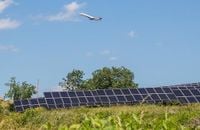Pittsburgh International Airport (PIT) is set to double its solar power footprint, significantly advancing its commitment to renewable energy and sustainability. On April 29, 2025, the airport announced an expansion of its solar field in partnership with Duquesne Light Company (DLC) and IMG Energy Solutions, a Liberty Energy company. This ambitious project will add 11,216 high-efficiency solar panels, enabling the generation of an additional 4.7 megawatts (MW) of clean energy. The expansion is anticipated to be completed by 2027.
The new solar field will complement the existing eight-acre solar array, which currently houses nearly 10,000 solar panels, and will utilize an additional 12 acres of land atop a closed landfill—land that is otherwise unsuitable for development. This initiative is expected to reduce carbon emissions by approximately 5 million pounds annually, further solidifying the airport's role as a leader in energy innovation.
"The expansion of more than 11,000 solar panels to Pittsburgh International Airport’s existing solar field is a fantastic step toward a more sustainable energy future for our region," said Allegheny County Executive Sara Innamorato. "I’m thrilled that our airport is an energy leader and that our local partners in DLC and IMG are able to help make important projects like this a reality."
The airport's microgrid, which was commissioned in 2021, has already demonstrated significant cost savings, saving the airport over $1 million per year in electricity costs. This microgrid, which combines a 23-MW gas-fired generator with solar energy, allows the airport to generate its own power while remaining connected to the main power grid as a backup. It has become a model for airport resiliency worldwide, particularly highlighted by recent power outages that affected major airports like London Heathrow.
"Pittsburgh International Airport is an energy leader, and we are thrilled to partner with Duquesne Light Company and IMG for this important regional project," stated PIT CEO Christina Cassotis. "We are maximizing the use of airport assets for the betterment of the region—from air service to real estate development to energy innovation, and there’s more to come."
The expansion will be owned and operated by IMG, which has committed to supplying 100% of the generated energy, along with the Renewable Energy Credits, to Duquesne Light. This arrangement ensures that the clean energy produced will be utilized to support the electricity needs of DLC’s default service customers, who do not actively select an electricity supplier outside of DLC.
"DLC is thrilled to be part of this groundbreaking project that highlights the vision of Pittsburgh International Airport as well as the strength of public-private partnerships in delivering meaningful progress for the Pittsburgh region," remarked Kevin Walker, president and CEO of Duquesne Light Company. "By expanding access to clean energy for local homes and businesses, we’re helping to drive economic growth and bringing to life our vision of a more sustainable future for all. This project represents an important step in delivering more renewable energy to our communities, friends, and neighbors."
In addition to the solar expansion, PIT has ambitious plans to produce synthetic aviation fuel on-site, which could position it as the first airport globally to undertake such an initiative. This move is part of the airport's broader strategy to enhance its energy portfolio and contribute to sustainable aviation practices.
"We’ve already set the global standard for resiliency," said Vince Gastgeb, PIT’s Chief Government and Corporate Affairs Officer. "Projects like this continue to build our credibility in the aviation industry." The airport's innovative approach not only focuses on energy production but also aims to create family-sustaining jobs and foster economic development in the region.
The Pittsburgh International Airport's commitment to environmental stewardship and energy innovation is increasingly recognized as a model for other airports across the United States and beyond. As the airport continues to expand its energy initiatives, it remains focused on maximizing its 8,800-acre campus for the benefit of the local community and the environment.
"These are the kind of public-private partnerships that this region really needs and thrives on," emphasized Brian Guzek, Vice President of Corporate Strategy at Duquesne Light. "The innovation that we see here at the airport continues to lead not just our region but the entire country and the world."
As the project progresses, stakeholders anticipate that the expansion of the solar field will enhance local energy production and contribute significantly to the economic growth of the Pittsburgh area. With its forward-thinking initiatives, Pittsburgh International Airport is not just keeping pace with the global shift towards renewable energy but is actively leading the charge.





